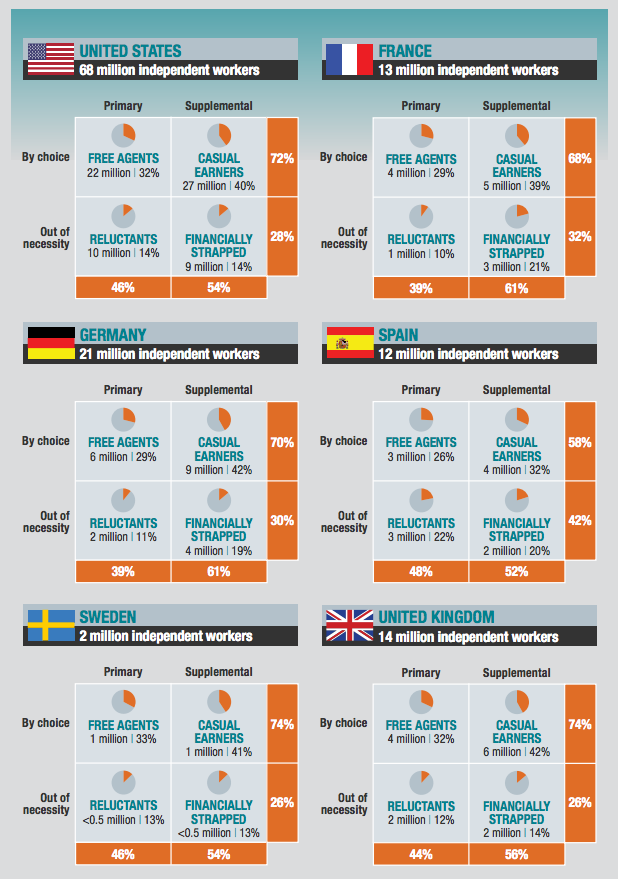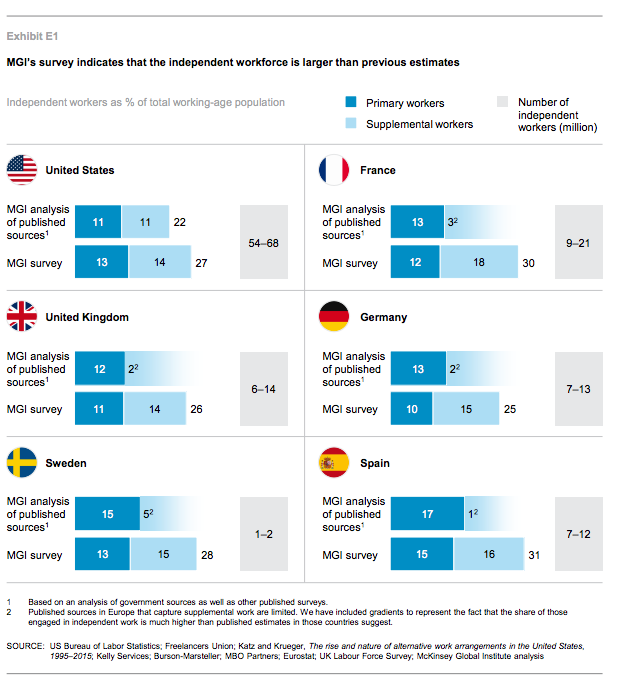A whole new definition of work is emerging from the digital economy. New research shows “the gig economy” rapidly replacing the norm of companies with offices full of expensive, dissatisfied full-time permanent workers.
That survey of workers in the developed world finds adoption of independent work is growing. Wait … not just growing, but reshaping everything we think we know about what constitutes “a good job.”
Here in the Netherlands, Dispatches’ home base, the idea of freelancing and working from project to project remains anathematic to Dutch values. As one of the Dutch startup entrepreneurs told me, none of the people he hired asked about equity. They wanted to know about the pension plan.
Seriously.
 That’s not true everywhere in Europe, according to a report by private think tank McKinsey Global Institute, research funded by McKinsey & Co., the giant Boston-based management consultancy. And research from MGI and other sources show the “gig economy” in which workers go from project to project is quickly supplanting the conventional employment model.
That’s not true everywhere in Europe, according to a report by private think tank McKinsey Global Institute, research funded by McKinsey & Co., the giant Boston-based management consultancy. And research from MGI and other sources show the “gig economy” in which workers go from project to project is quickly supplanting the conventional employment model.
In that report, “Independent Work: Choice, Necessity, and the Gig Economy,” MGI researches how the world is trending away from the rigidity of full-time jobs with one employer to – as the report phrases it – the flexibility of “tens of millions who put together their own income streams and shape their own work lives” in the digital economy.
And the number of people in the gig economy is far larger than previously thought. For instance, Germany has 21 million independent workers, France 13 million and Spain 12 million. (See the chart at right.)
This is to some extent about the digital age making it easier to work from home, co-working spaces or the local coffee shop.
(Wherever Dispatches editors or contributors are at any given moment is our “headquarters.”)
The report notes that though European policy makers are more resistant to digital employment platforms such as Upwork, Uber and Lyft than the United States, digital employment is accelerating here big time. “Independent Work” states that 20-30 percent of working-age residents of the developed European countries (The EU15) such as Germany, are indie workers.
And unlike in the Netherlands where any permanent job tops working in the gig economy, McKinsey researchers found 1 in 6 people who responded to their six-country survey aspired to the autonomy and flexibility of being independent workers. Not only that, but the research found that people who had chosen the indie work life had higher levels of career satisfaction than any other group surveyed.
From the report:
Free agents cite higher satisfaction than traditional workers across issues ranging from the creativity they can express to opportunities for learning and recognition. They are happier with their overall level of income and are just as satisfied as traditional workers on income security and benefits. These observations hold regardless of gender, age, education level, or household income.
But the new gig economy is stratified. There are those who want to be free agents and those who are only because that’s the only type of work they can get.
But, in all six survey countries, those who are independent by preference outnumber those who are independent out of necessity by a substantial margin.
From the report:
• There are four key segments of independent workers: Thirty percent are “free agents,” who actively choose independent work and derive their primary income from it. Approximately 40 percent are “casual earners,” who use independent work for supplemental income and do so by choice. “Reluctants,” who make their primary living from independent work but would prefer traditional jobs, make up 14 percent. The “financially strapped,” who do supplemental independent work out of necessity, account for 16 percent.
• ƒ Those who do independent work by choice (free agents and casual earners) report greater satisfaction with their work lives than those who do it out of necessity (reluctants and the financially strapped), a finding that holds across countries, age, income, and education. In fact, free agents report even higher levels of satisfaction than those in traditional jobs by choice. Those working out of necessity, whether as independent workers or in traditional jobs, report similar levels of dissatisfaction with their work.
The gig economy has the greatest penetration in countries struggling to create full-time, permanent jobs. For example, 42 percent of independent workers in Spain are classed as “reluctants” or financially strapped, while the percentage of somewhat desperate people is 30 percent or below in the other five, much stronger economies of the U.S., UK, Germany, Sweden and France.
Spain has a larger share of independent earners than the other five survey countries, and nearly 40 percent of the gig economy jobs in Spain are low-income. Temp jobs are so common in Spain the phenomenon has created a two-tiered labor market, according to the report. Nearly two-thirds of young people in Spain are independent workers!
While the analysis of the six countries is interesting, the deep data dive in “Independent Work” comes when McKinsey researchers start looking at the big-data ramifications of the digital aspect of the gig economy.
Digital platforms such as Uber that match service providers with demand create far more transparent, efficient markets and generate massive amounts of data about customer preferences and transactional security.
“Independent Work” also upended some myths about the gig economy. For example, it’s not a bunch of kids hustling until they get “real” jobs.
While more than half of those under age 25 participate in all countries, they represent less than one-quarter of independent workers in the gig economy.
And this was particularly surprising.
Sure, independent work is prevalent in the construction trades, household and personal services, and transportation. “It is also preferred by many professionals such as doctors, therapists, lawyers, accountants, interior designers, and writers,” according to the McKinsey research.
This report, while it makes fast and satisfying reading, is really for the decision-makers in the C-suites.
What, you don’t have the two hours we spent reading the entire 148-page report? Here are the gritty details:
For the “Independent Work” research, MGI conducted an online survey in June and July this summer, reaching more than 8,000 respondents in the United States, the United Kingdom, Germany, Sweden, France, and Spain.
• Independent work has three defining features: a high degree of autonomy; payment by task, assignment, or sales; and a short-term relationship between worker and client. Our definition encompasses people who provide labor services as well as those who sell goods or rent assets.
• While some people find independent work more lucrative and satisfying, many more worry about the lack of benefits and security large employers provide permanent staff. Though that kinda doesn’t matter, because lifetime employment at one company has gone the way of the blue goose in the digital age. Well, the McKinsey report doesn’t exactly put it that way, but that’s the essence of their trend analysis.
Co-CEO of Dispatches Europe. A former military reporter, I'm a serial expat who has lived in France, Turkey, Germany and the Netherlands.
















